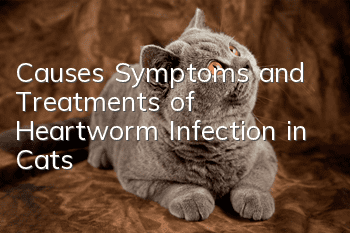Causes, Symptoms and Treatments of Heartworm Infection in Cats

Heartworm infection in cats is mainly transmitted by insects and mosquitoes as hosts; early symptoms of heartworm include chronic cough, fatigue during exercise, etc.; drugs such as sodium thiarsenamide and ivermectin can be used to treat heartworm. , we should also prevent parasites at ordinary times and deworm cats regularly.
Causes of heartworm infection in cats
The intermediate hosts required for the life cycle of heartworms are blood-sucking insects, mosquitoes, etc. Therefore, the infection period of the disease is from June to October when mosquitoes are most active every year, and the strongest infection period is from July to September.
Symptoms of heartworm infection in cats
The earliest symptom is a chronic cough that worsens during exercise, or the cat becomes easily fatigued during exercise. As the disease progresses, the cat develops hyperpalpitations, a thin and intermittent pulse, and a murmur in the heart. The liver area is painful on palpation and hepatomegaly. Fluid accumulation in the chest and abdomen, and edema all over the body. Difficulty breathing. In cases of long-term infection, pulmonary heart disease and heart disease are obvious. In the final stage, death occurs due to systemic weakness or collapse during exercise. Sick cats are often accompanied by nodular skin disease, which is characterized by itching and multiple focal nodules that tend to rupture.
Treatment of heartworm infection in cats
1. Killing of adult insects
(1) Sodium thiarsenamide, the dose is 2.2 mg/kg body weight, slowly intravenously injected, twice a day, for 2 days. ◊Before, during, and after treatment, aspirin is given. Beneficial to Cats ◊⑵ Hydrochloric acid is used to remove arsenic. The dose is 2.5 mg/kg body weight. Use distilled water to make a 1% solution. Inject slowly intravenously, once every 4 to 5 days. This drug has a strong anthelmintic effect.
2. Repelling and killing larvae
(1) Use ivermectin 0.05~0.1 mg/kg body weight, once subcutaneously. Fenthion 2 is the most effective drug for killing larvae. 7% fenthion solution is injected subcutaneously at a dose of 0.2 ml/kg body weight. Repeat once every two weeks if necessary. Do not use any pesticides or drugs that inhibit choleesterase activity before or after using fenthion.
3. Heart contact prevention
It is necessary to prevent bites from blood-sucking insects (mosquitoes, eggs, etc.), exterminate mosquito eggs, and use drug prevention. Diethylcarbamazine is an oral agent. The dosage is 6.6 mg per kg. It should be used during the mosquito and fly activity season. For larvae-positive cats, it is strictly forbidden to use diethylcarbamazine. The adult worms and larvae must be killed with medication before diethylcarbamazine can be used for prevention.
- How do you judge the appearance of Garfield cat?
- Can cats eat dried fish? What are the taboos for cats eating dried fish?
- What should I do if my cat is too timid? How can I improve my cat’s courage?
- Why do cats like to bite things?
- Introduction to the causes of oral ulcers in cats
- What level of protection is the prairie spotted cat?
- Why does the blue cat’s hair turn yellow?
- What are the signs that a cat is pregnant and about to give birth?
- How to help a kitten stuck in the birth canal be born smoothly?
- What does it mean when a big cat bites a kitten's neck?



